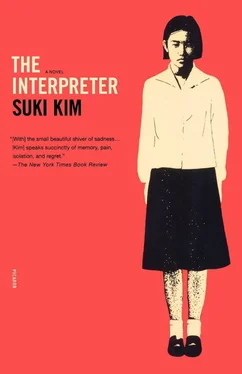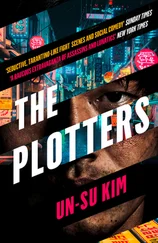“Nothing at all. I think it’s my period.” She quickly change her mind. It is not fair to dump it on Michael. It is too late for them to be anything but what they are. It is really not his fault.
“ Christ, sometimes you fucking surprise me.” He breaks into nervous laughter. He is relieved.
“I think I better go lie down.”
“You do that. But I’m gonna call and check up on you.”
“Don’t. I’m gonna sleep for a while.” She does not want any more calls this morning.
“You need anything? Should I get Sandy to send you a doctor or something?”
Suzy laughs at his suggestion. How absurd, a doctor making a house call to her East Village flat? Michael. He will try anything. He will make anything happen. Anything . Of course, why hasn’t she thought of it before?
“There is something, actually.”
“Just name it.” Michael is trying to hide his surprise. Suzy has never asked for anything. She has never had a request for him.
“I need to find out about my citizenship status. And that of my parents. I need to know on what grounds those citizenships were issued, if they were issued. I need them fairly soon.”
“Done. Sandy will call you in five minutes and take down the info. I’ll tell her to send you a doctor also. What else?” He is a good businessman. Gets the job done. No questions asked.
“Nothing else.”
“Sure?”
Suzy is suddenly so grateful that she wants to cry. She must have been alone for too long. She is not used to getting help.
“Michael?”
“What?”
“Thank you.”
“Shut up and go get some sleep. And for God’s sake, don’t act so fucking polite.”
From her seat at the window, she can see the bustle on 32nd Street. The same bone-marrow-soup restaurant, just downstairs from the accountant’s office. Several tables are occupied already although it is barely noon, not quite lunchtime. Whereas Americans crave eggs and bacon on bleary mornings, Koreans go straight for a steaming bowl of bone soup topped with freshly chopped scallions. They swear that it magically heals the unsettled stomach, the best cure in the world for hangovers. Koreans are known as the Italians of the East. They drink hard and eat to their heart’s content. Indeed, the faces bending over the clay bowls appear quite pale, as though they have not yet recovered from the night’s triple rounds of soju and karaoke. Some of them sneak glances at Suzy sitting alone, hiding behind the Korea Daily , which she bought from the dispenser upon entering the restaurant. The sudden flash of Korean letters confuses her for a second. She glares at the print without making sense of it. She stares instead at the row of restaurants across the street. The second-floor windows are plastered with neon signs for hair salons, acupuncturists, even a twenty-four-hour steam bath. The third and fourth floors continue up the same way, cluttered with shops that only Koreans frequent. It is a way of cramming the immigrant life into one tiny block. One could stroll back and forth along this quarter-mile stretch and find anything, from bridal gowns to Xerox toners. Nothing is missing. No craving is hard to fill. It’s all here, right on 32nd Street.
The accountant was useless. Mr. Bae was his name. A smallish man with a shocking amount of grease in his neatly parted hair. He barely looked up when Suzy entered. Although she introduced herself three times, he continued to ignore her. Even his assistant seemed embarrassed by such an outrageously rude reception. When Suzy started to ask him about her parents’ file, he cut her off in the middle, “First, your sister specifically asked me not to engage in any talks with you. Second, your sister has terminated her business with me as of last week, so I’m no longer working on her case, which naturally includes your parents’ file. Third, I told you once that you’ll regret giving up your inheritance rights, but, just like your sister, you thought my advice wasn’t worth a dime. Fourth, as you can see, I’m a busy man, with more than enough work to do for my clients, so I’d appreciate it if you’d stop wasting my time.” Then he turned back to the stack of files on his desk, leaving Suzy standing there tongue-tied. His hostility seemed unreasonable and clearly immutable. So Suzy walked out, feeling wounded, as though she had just been scolded by someone dear, and it wasn’t until she reached downstairs that she remembered bone-marrow soup and felt suddenly hopeful.
Once she sat down, the smell of brewing bones from the kitchen tugged at her. A taste from her childhood, although her mother rarely made such a variety: sulongtang, komtang, korikomtang , doganitang. From tail bones to knee bones and cartilage to tripe, the choice depends on taste. A true connoisseur would swear by the subtlety of each, but for Suzy they all taste somewhat similar. Just a tinge of Korean flavors inevitably brings her back to Memory Lane. A pinch of garlic, scallion, ginger would sure enough do the trick, although her house had never been filled with such culinary extravaganza. The family usually made do with white rice and a couple of side dishes, maybe a stew or two, either of tofu or miso. Always kimchi on one side of the table, and on the other, fried anchovies and salted pollack eggs. They were almost always store-bought. Mom barely had time for sleep, never mind brewing oxtail bones or marinating kimchi.
After Suzy moved out of her parents’ house, she often stopped by this neighborhood, whenever she craved Korean food. She would sit alone with a book or a newspaper and order a bowl of sulongtang. People would stare at her, because Korean girls rarely ate alone. Back then, there was no way one could get ahold of kimchi on 116th Street. Sure, Columbia was filled with students from around the world. Along Broadway, there were a number of Chinese takeouts, as well as a few sushi bars. And if you really wanted to splurge, it wasn’t hard to find all kinds of exotic food, from the candlelit Tibetan parlor on Riverside to the hole-in-the-wall Ethiopian takeout near the Law School building. Yet for Korean food you still had to travel down to 32nd Street. It was still the end of the eighties. The kimchi trend had not yet begun among students. It soon stopped mattering, though, because things changed almost overnight. First, when Damian happened in her life, she stopped craving anything except him. She would go wherever he suggested. She would skip food all day if that was what he wanted. Besides, they would not have dared entering 32nd Street together, for fear of bumping into anyone they knew. Then, later, with her parents’ death, everything lost its color. On certain rainy days, she would wander into this corner of the city, wanting so much, wanting anything on the menu. She would experience such an immense hunger that she wouldn’t know which dish to choose. It was as if she was looking to fill a certain longing, a certain desperation. Yet, by the time the food arrived, she no longer had any appetite. In fact, she could not bear the sudden rush of Korean flavors. It was impossible. It hit too close to home. It fell upon her like a sad awakening. Soon she just stopped coming.
But the soup tastes so good today, tangy, with lots of juice. It is a perfect soup for the cool weather, milky white and hot. The lumpy bits must be cartilage, rolling so smoothly on her tongue. She may still be the same girl after all, the one who would skip classes and hop on a subway all the way from 116th Street just for a bowl of soup and a plate of kimchi . She is so comforted by this thought that she almost forgets about the mean accountant, and the hushed tone of the caller who seemed afraid for her life. She is about to ask for another plate of kimchi when she notices the ad at the bottom of the Korea Daily’s front page. “The New Joy Fellowship Church,” it reads. “Join us for the Thanksgiving Sermon at our God’s House, the largest Korean church in New Jersey! Parking spaces available. Live Broadcasting on www.newjoyfellowship.org.”
Читать дальше












